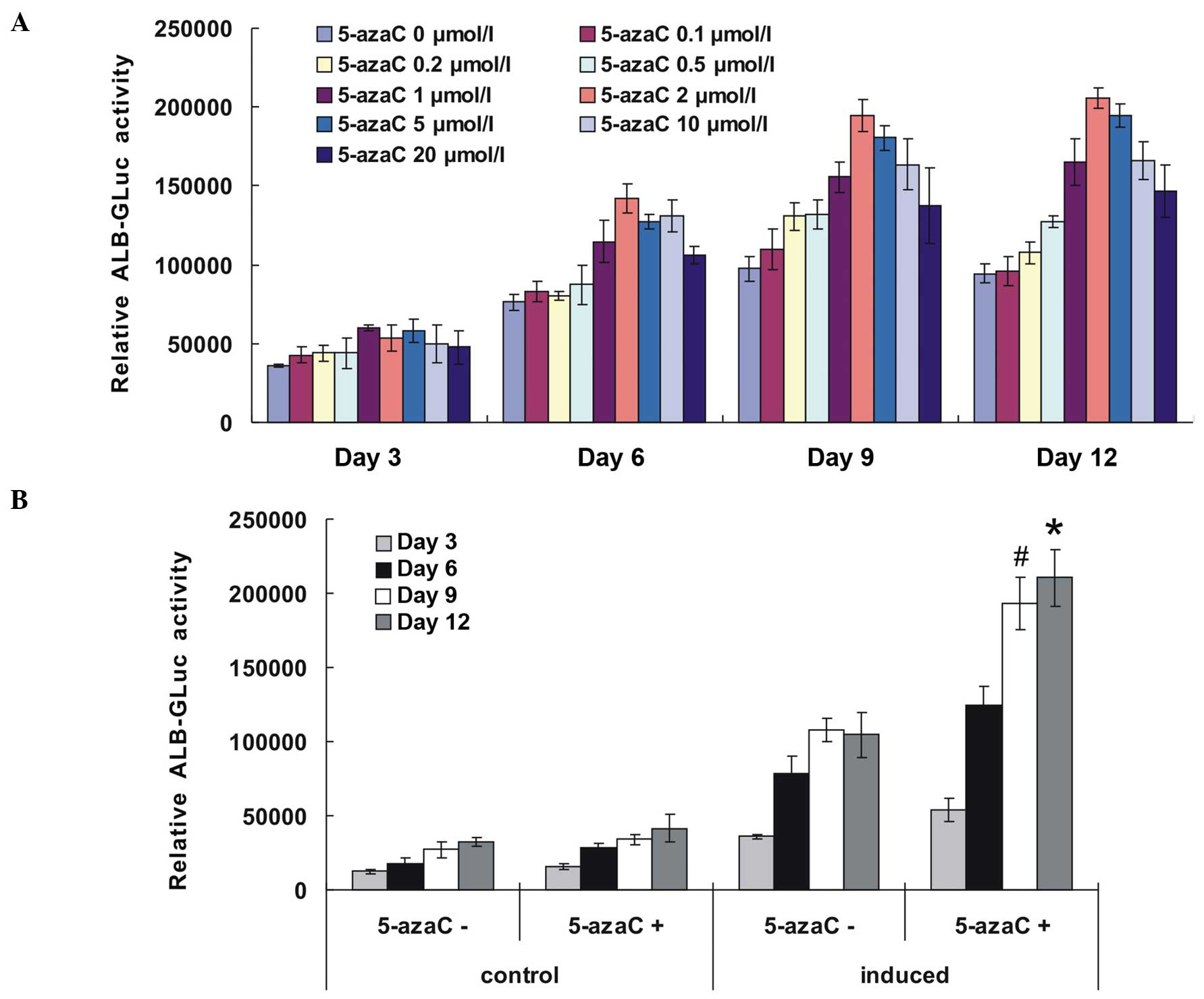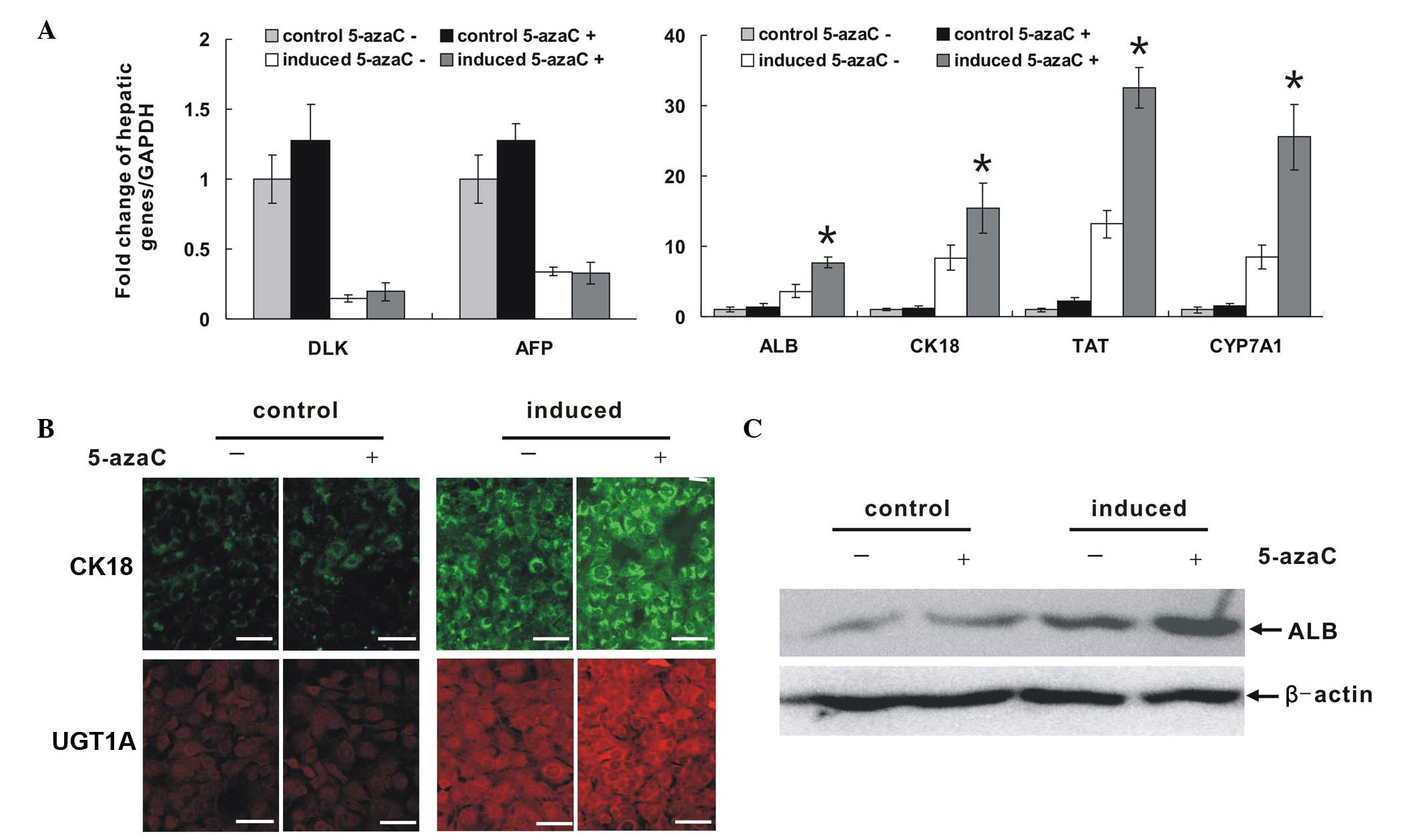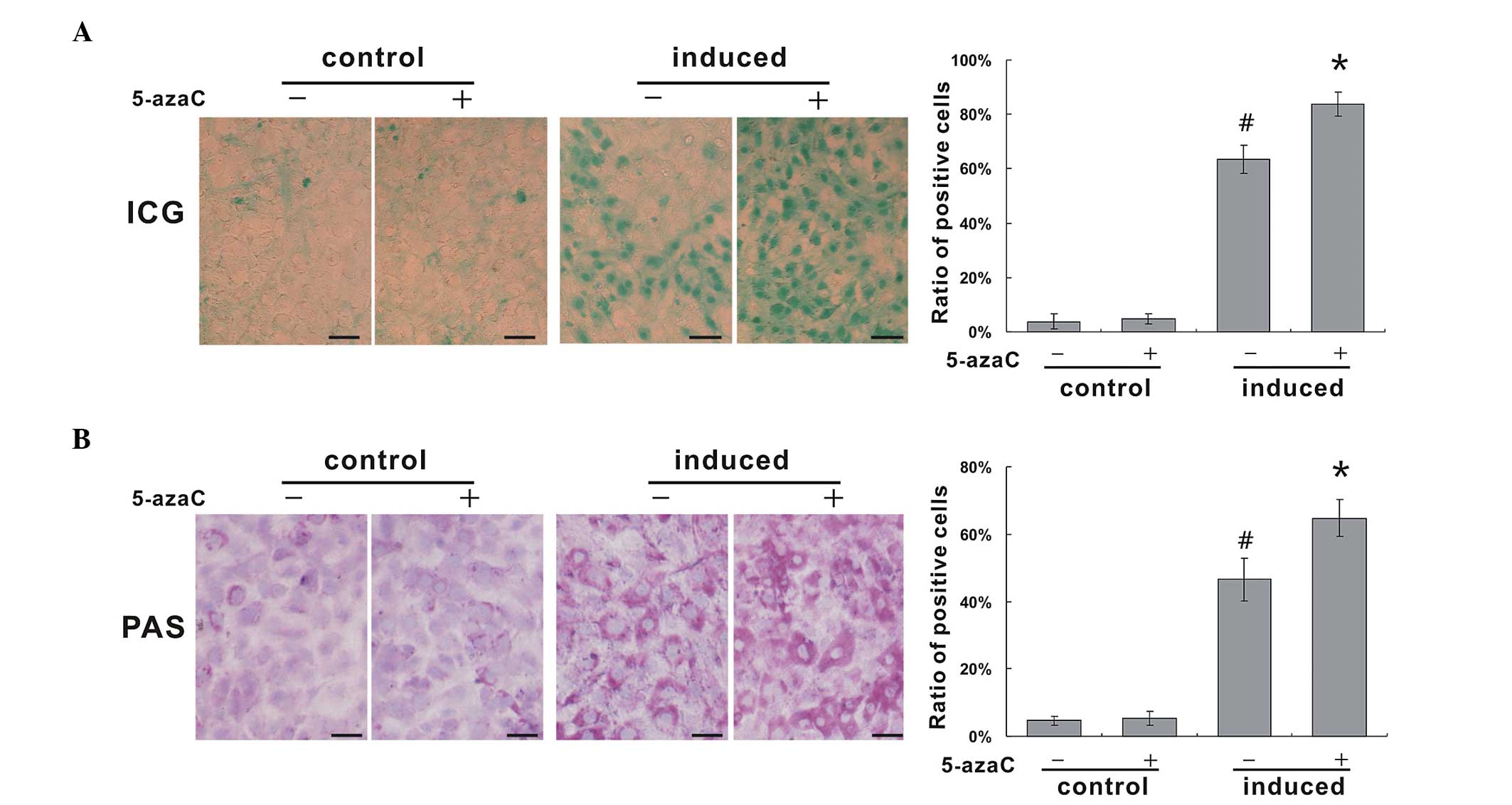|
1
|
Samuel D, Colombo M, El-Serag H, Sobesky R
and Heaton N: Toward optimizing the indications for orthotopic
liver transplantation in hepatocellular carcinoma. Liver Transpl.
17(Suppl 2): S6–S13. 2011. View
Article : Google Scholar : PubMed/NCBI
|
|
2
|
Adam R and Hoti E: Liver transplantation:
The current situation. Semin Liver Dis. 29:3–18. 2009. View Article : Google Scholar : PubMed/NCBI
|
|
3
|
Oertel M: Fetal liver cell transplantation
as a potential alternative to whole liver transplantation? J
Gastroenterol. 46:953–965. 2011. View Article : Google Scholar : PubMed/NCBI
|
|
4
|
Hughes RD, Mitry RR and Dhawan A: Current
status of hepatocyte transplantation. Transplantation. 93:342–347.
2012. View Article : Google Scholar
|
|
5
|
Haridass D, Narain N and Ott M: Hepatocyte
transplantation: Waiting for stem cells. Curr Opin Organ
Transplant. 13:627–632. 2008. View Article : Google Scholar : PubMed/NCBI
|
|
6
|
Sancho-Bru P, Najimi M, Caruso M, et al:
Stem and progenitor cells for liver repopulation: Can we
standardise the process from bench to bedside? Gut. 58:594–603.
2009. View Article : Google Scholar
|
|
7
|
Kakinuma S, Nakauchi H and Watanabe M:
Hepatic stem/progenitor cells and stem-cell transplantation for the
treatment of liver disease. J Gastroenterol. 44:167–172. 2009.
View Article : Google Scholar : PubMed/NCBI
|
|
8
|
Sharma AD, Cantz T, Vogel A, et al: Murine
embryonic stem cell-derived hepatic progenitor cells engraft in
recipient livers with limited capacity of liver tissue formation.
Cell Transplant. 17:313–323. 2008. View Article : Google Scholar : PubMed/NCBI
|
|
9
|
Tomiyama K, Miyazaki M, Nukui M, et al:
Limited contribution of cells of intact extrahepatic tissue origin
to hepatocyte regeneration in transplanted rat liver.
Transplantation. 83:624–630. 2007. View Article : Google Scholar : PubMed/NCBI
|
|
10
|
Venturelli S, Berger A, Weiland T, et al:
Differential induction of apoptosis and senescence by the DNA
methyltransferase inhibitors 5-azacytidine and
5-aza-2′-deoxycytidine in solid tumor cells. Mol Cancer Ther.
12:2226–2236. 2013. View Article : Google Scholar : PubMed/NCBI
|
|
11
|
Kang PL, Chen CH, Chen SY, et al:
Nanosized collagen I molecules enhanced the differentiation of rat
mesenchymal stem cells into cardiomyocytes. J Biomed Mater Res A.
101:2808–2816. 2013. View Article : Google Scholar : PubMed/NCBI
|
|
12
|
Moscoso I, Centeno A, López E, et al:
Differentiation ‘in vitro’ of primary and immortalized porcine
mesenchymal stem cells into cardiomyocytes for cell
transplantation. Transplant Proc. 37:481–482. 2005. View Article : Google Scholar : PubMed/NCBI
|
|
13
|
Rosca AM and Burlacu A: Effect of
5-azacytidine: Evidence for alteration of the multipotent ability
of mesenchymal stem cells. Stem Cells Dev. 20:1213–1221. 2011.
View Article : Google Scholar
|
|
14
|
De Carvalho DD, You JS and Jones PA: DNA
methylation and cellular reprogramming. Trends Cell Biol.
20:609–617. 2010. View Article : Google Scholar : PubMed/NCBI
|
|
15
|
Kamiya A, Gonzalez FJ and Nakauchi H:
Identification and differentiation of hepatic stem cells during
liver development. Front Biosci. 11:1302–1310. 2006. View Article : Google Scholar
|
|
16
|
Bi Y, He Y, Huang JY, et al: Induced
maturation of hepatic progenitor cells in vitro. Braz J Med Biol
Res. 46:559–566. 2013. View Article : Google Scholar : PubMed/NCBI
|
|
17
|
Bi Y, Huang J, He Y, et al: Wnt antagonist
SFRP3 inhibits the differentiation of mouse hepatic progenitor
cells. J Cell Biochem. 108:295–303. 2009. View Article : Google Scholar : PubMed/NCBI
|
|
18
|
Bi Y, Gong M, He Y, Wei X, Chen J and Li
T: Adenovirus-mediated RAR-β over-expression enhances ATRA-induced
neuronal differentiation of rat mesenchymal stem cells. Arch Med
Sci. 9:314–322. 2013. View Article : Google Scholar : PubMed/NCBI
|
|
19
|
He Y, Zhou JW, Xu L, Gong MJ, He TC and Bi
Y: Comparison of proliferation and differentiation potential
between mouse primary hepatocytes and embryonic hepatic progenitor
cells in vitro. Int J Mol Med. 32:476–484. 2013.PubMed/NCBI
|
|
20
|
Yamada T, Yoshikawa M, Kanda S, et al: In
vitro differentiation of embryonic stem cells into hepatocyte-like
cells identified by cellular uptake of indocyanine green. Stem
Cells. 20:146–154. 2002. View Article : Google Scholar : PubMed/NCBI
|
|
21
|
Yoshie S, Ito J, Shirasawa S, et al:
Establishment of novel detection system for embryonic stem
cell-derived hepatocyte-like cells based onnongenetic manipulation
with indocyanine green. Tissue Eng Part C Methods. 18:12–20. 2012.
View Article : Google Scholar
|
|
22
|
König M, Bulik S and Holzhütter HG:
Quantifying the contribution of the liver to glucose homeostasis: A
detailed kinetic model of human hepatic glucose metabolism. PLoS
Comput Biol. 8:e10025772012. View Article : Google Scholar : PubMed/NCBI
|
|
23
|
Weiss TS, Lichtenauer M, Kirchner S, et
al: Hepatic progenitor cells from adult human livers for cell
transplantation. Gut. 57:1129–1138. 2008. View Article : Google Scholar : PubMed/NCBI
|
|
24
|
Sangan CB and Tosh D: Hepatic progenitor
cells. Cell Tissue Res. 342:131–137. 2010. View Article : Google Scholar : PubMed/NCBI
|
|
25
|
Sokal EM: From hepatocytes to stem and
progenitor cells for liver regenerative medicine: Advances and
clinical perspectives. Cell Prolif. 44(Suppl 1): 39–43. 2011.
View Article : Google Scholar : PubMed/NCBI
|
|
26
|
Heo J, Factor VM, Uren T, et al: Hepatic
precursors derived from murine embryonic stem cells contribute to
regeneration of injured liver. Hepatology. 44:1478–1486. 2006.
View Article : Google Scholar : PubMed/NCBI
|
|
27
|
Zhang W, Li W, Liu B, Wang P, Li W and
Zhang H: Efficient generation of functional hepatocyte-like cells
from human fetal hepatic progenitor cells in vitro. J Cell Physiol.
227:2051–2058. 2012. View Article : Google Scholar
|
|
28
|
You N, Liu W, Zhong X, Dou K and Tao K:
Possibility of the enhanced progression of fetal liver
stem/progenitor cells therapy for treating end-stage liver diseases
by regulating the notch signaling pathway. Arch Med Res.
43:585–587. 2012. View Article : Google Scholar : PubMed/NCBI
|
|
29
|
Chen Q, Khoury M, Limmon G, Choolani M,
Chan JK and Chen J: Human fetal hepatic progenitor cells are
distinct from, but closely related to, hematopoietic
stem/progenitor cells. Stem Cells. 31:1160–1169. 2013. View Article : Google Scholar : PubMed/NCBI
|
|
30
|
Friedman JR and Kaestner KH: On the origin
of the liver. J Clin Invest. 121:4630–4633. 2011. View Article : Google Scholar : PubMed/NCBI
|
|
31
|
Du Z, Wei C, Yan J, et al: Mesenchymal
stem cells overexpressing C-X-C chemokine receptor type 4 improve
early liver regeneration of small-for-size liver grafts. Liver
Transpl. 19:215–225. 2013. View
Article : Google Scholar
|
|
32
|
Haga S, Ozaki M, Inoue H, et al: The
survival pathways phospha-tidylinositol-3 kinase
(PI3-K)/phosphoinositide-dependent protein kinase 1 (PDK1)/Akt
modulate liver regeneration through hepatocyte size rather than
proliferation. Hepatology. 49:204–214. 2009. View Article : Google Scholar
|
|
33
|
Kwon HJ, Won YS, Yoon YD, et al: Vitamin
D3 up-regulated protein 1 deficiency accelerates liver regeneration
after partial hepatectomy in mice. J Hepatol. 54:1168–1176. 2011.
View Article : Google Scholar
|
|
34
|
Turner RA, Wauthier E, Lozoya O, et al:
Successful transplantation of human hepatic stem cells with
restricted localization to liver using hyaluronan grafts.
Hepatology. 57:775–784. 2013. View Article : Google Scholar :
|
|
35
|
Lozoya OA, Wauthier E, Turner RA, et al:
Regulation of hepatic stem/progenitor phenotype by microenvironment
stiffness in hydrogel models of the human liver stem cell niche.
Biomaterials. 32:7389–7402. 2011. View Article : Google Scholar : PubMed/NCBI
|
|
36
|
Ding YB, Long CL, Liu XQ, et al:
5-aza-2′-deoxycytidine leads to reduced embryo implantation and
reduced expression of DNA methyltransferasesand essential
endometrial genes. PLoS One. 7:e453642012. View Article : Google Scholar
|
|
37
|
Ghoshal K and Bai S: DNA
methyltransferases as targets for cancer therapy. Drugs Today
(Barc). 43:395–422. 2007. View Article : Google Scholar
|
|
38
|
Buckstein R, Yee K and Wells RA; Canadian
Consortium on Evidence-based Care in MDS: 5-Azacytidine in
myelodysplastic syndromes: A clinical practice guideline. Cancer
Treat Rev. 37:160–167. 2011. View Article : Google Scholar
|
|
39
|
Deng G, Kakar S, Okudiara K, Choi E,
Sleisenger MH and Kim YS: Unique methylation pattern of oncostatin
m receptor gene in cancers of colorectum and other digestive
organs. Clin Cancer Res. 15:1519–1526. 2009. View Article : Google Scholar : PubMed/NCBI
|
|
40
|
Wakitani S, Saito T and Caplan AI:
Myogenic cells derived from rat bone marrow mesenchymal stem cells
exposed to 5-azacytidine. Muscle Nerve. 18:1417–1426. 1995.
View Article : Google Scholar : PubMed/NCBI
|
|
41
|
Makino S, Fukuda K, Miyoshi S, et al:
Cardiomyocytes can be generated from marrow stromal cells in vitro.
J Clin Invest. 103:697–705. 1999. View Article : Google Scholar : PubMed/NCBI
|
|
42
|
Yeh HY, Liu BH and Hsu SH: The
calcium-dependent regulation of spheroid formation and
cardiomyogenic differentiation for MSCs on chitosan membranes.
Biomaterials. 33:8943–8954. 2012. View Article : Google Scholar : PubMed/NCBI
|
|
43
|
Naeem N, Haneef K, Kabir N, Iqbal H,
Jamall S and Salim A: DNA methylation inhibitors, 5-azacytidine and
zebularine potentiate the transdifferentiation of rat bone marrow
mesenchymal stem cells into cardiomyocytes. Cardiovasc Ther.
31:201–209. 2013. View Article : Google Scholar
|
|
44
|
Pennarossa G, Maffei S, Campagnol M,
Rahman MM, Brevini TA and Gandolfi F: Reprogramming of pig dermal
fibroblast into insulin secreting cells by a brief exposure to
5-aza-cytidine. Stem Cell Rev. 10:31–43. 2014. View Article : Google Scholar
|
|
45
|
Ravichandran R, Venugopal JR, Mueller M,
et al: Buckled structures and 5-azacytidine enhance cardiogenic
differentiation of adipose-derived stem cells. Nanomedicine (Lond).
8:1985–1997. 2013. View Article : Google Scholar
|
|
46
|
Wang XM, Wang X, Li J and Evers BM:
Effects of 5-azacytidine and butyrate on differentiation and
apoptosis of hepatic cancer cell lines. Ann Surg. 227:922–931.
1998. View Article : Google Scholar : PubMed/NCBI
|
|
47
|
Guo Y, Engelhardt M, Wider D, Abdelkarim M
and Lübbert M: Effects of 5-aza-2′-deoxycytidine on proliferation,
differentiation and p15/INK4b regulation of human hematopoietic
progenitor cells. Leukemia. 20:115–121. 2006. View Article : Google Scholar
|
|
48
|
Zhou Y and Lu Q: DNA methylation in T
cells from idiopathic lupus and drug-induced lupus patients.
Autoimmun Rev. 7:376–383. 2008. View Article : Google Scholar : PubMed/NCBI
|
|
49
|
Dhawan D, Ramos-Vara JA, Hahn NM, et al:
DNMT1: An emerging target in the treatment of invasive urinary
bladder cancer. Urol Oncol. 31:1761–1769. 2013. View Article : Google Scholar
|
|
50
|
Stern-Straeter J, Bonaterra GA, Juritz S,
et al: Evaluation of the effects of different culture media on the
myogenic differentiation potential of adipose tissue- or bone
marrow-derived human mesenchymal stem cells. Int J Mol Med.
33:160–170. 2014.
|
|
51
|
Ramesh B, Bishi DK, Rallapalli S, Arumugam
S, Cherian KM and Guhathakurta S: Ischemic cardiac tissue
conditioned media induced differentiation of human mesenchymal stem
cells into early stage cardiomyocytes. Cytotechnology. 64:563–575.
2012. View Article : Google Scholar : PubMed/NCBI
|
|
52
|
Nishina H: hDlk-1: A cell surface marker
common to normal hepatic stem/progenitor cells and carcinomas. J
Biochem. 152:121–123. 2012. View Article : Google Scholar : PubMed/NCBI
|
|
53
|
Kuhlmann WD and Peschke P: Hepatic
progenitor cells, stem cells, and AFP expression in models of liver
injury. Int J Exp Pathol. 87:343–359. 2006. View Article : Google Scholar : PubMed/NCBI
|
|
54
|
Yang J, Corsello TR and Ma Y: Stem cell
gene SALL4 suppresses transcription through recruitment of DNA
methyltransferases. J Biol Chem. 287:1996–2005. 2012. View Article : Google Scholar :
|
|
55
|
Mi XB and Zeng FQ: Hypomethylation of
interleukin-4 and -6 promoters in T cells from systemic lupus
erythematosus patients. Acta Pharmacol Sin. 29:105–112. 2008.
View Article : Google Scholar
|

















